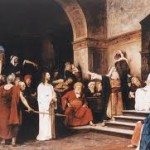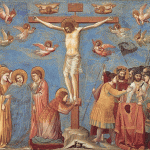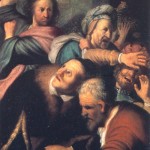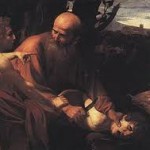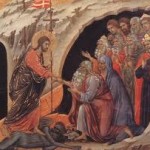Fourth Sunday in Lent – Cycle B
Reflecting on John 3: 14-21
Many years ago, Father Raymond Brown, the world’s authority on the Gospel of John, gave a seminar in Denver. The hotel room was packed with adoring students―clergy, members of religious communities, theologians and scripture students all gave rapt attention to every fascinating insight he gave us into this most soaring and symbolic gospel.
At noon we all happily went into the ballroom for lunch, and he, a health nut, went out to swim a few laps in the hotel pool. Later in the afternoon, as he was teaching the section we heard in today’s Gospel, he told us this story:
You know, while you all were sitting and eating at noon today, I was swimming laps in the pool. I took off my crucifix and put it on the chair, and when I was done swimming I was putting it back on when a young man approached me. He said, “I see you wear a cross. Are you sure you know Jesus as your personal savior?” I said, “Thank you for asking me. I try every day to know him more and more.”
The audience went up in a roar! Can you imagine the nerve, the naiveté, the ignorance of that young man, approaching the great scholar and asking him if he knows Jesus! But Raymond Brown was confused by our response. “Why is that so strange? Just because a person studies scripture doesn’t mean that they necessarily know Jesus. I was grateful that he cared enough to ask.”
The next time you see someone holding up John 3:16 at a football game, don’t judge. They are willing to risk looking foolish on the chance that they might help us know Jesus better.
Have you ever risked looking foolish so that someone might know Jesus?

